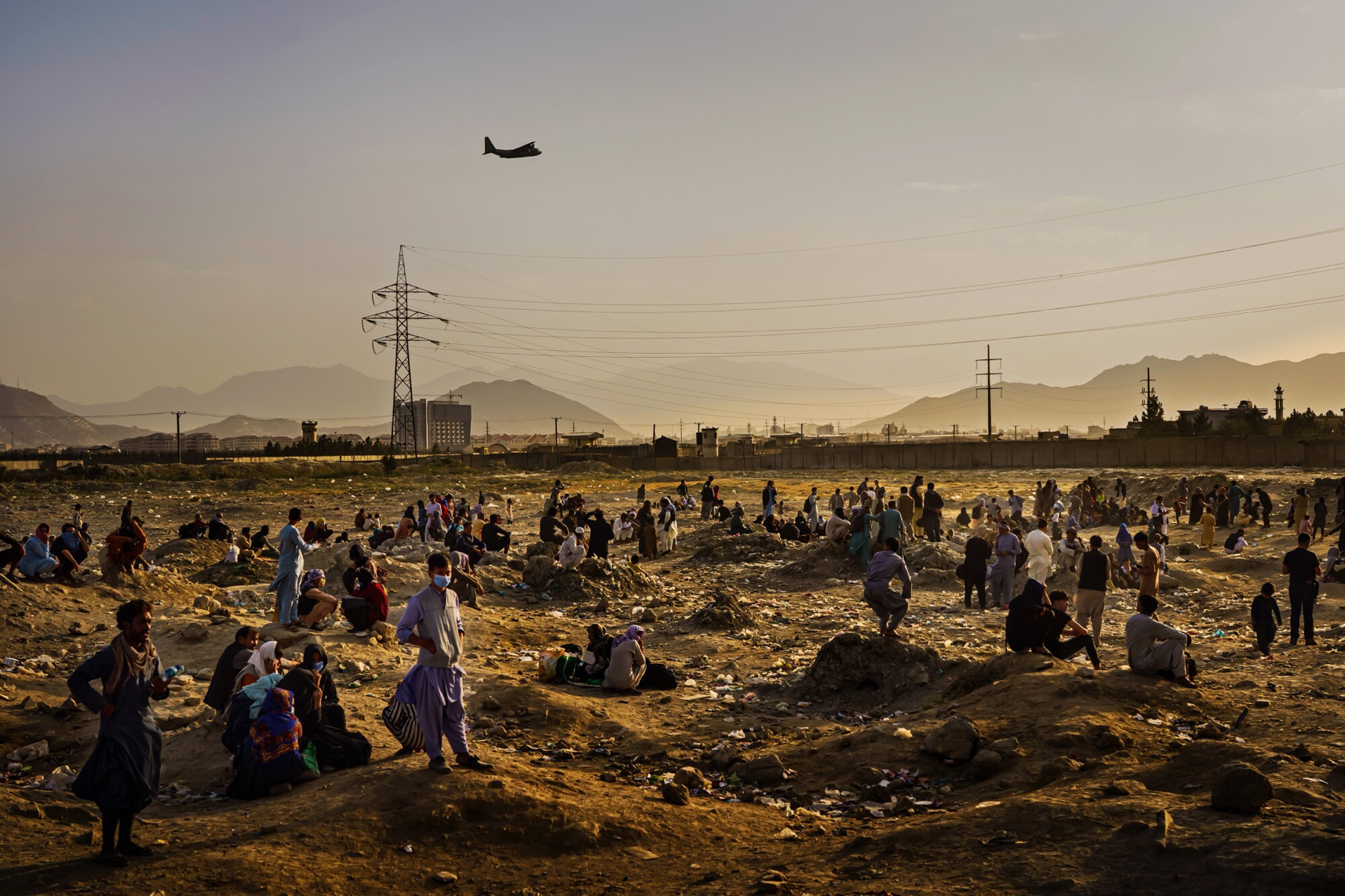Many are frustrated that a program known as humanitarian parole has left Afghans waiting in danger for months with no response
After the last evacuation flights left Afghanistan, Homayra Yusufi’s family was one of many that scrambled to file applications to help their loved ones reach safety in the United States.
Well over half a year later, Yusufi’s 10 family members, like thousands of others still in danger now that the Taliban has taken over, are still waiting for an answer from the U.S. government.
This story is for subscribers
We offer subscribers exclusive access to our best journalism.
Thank you for your support.
More than 41,000 such applications — which would allow them to enter the U.S. temporarily under a special program called humanitarian parole — are still pending for Afghans, according to statistics provided by the Department of Homeland Security. Of the roughly 4,180 who have received responses so far, only 280 have been approved. The other 3,900, or about 93 percent, were denied.
“We hear stories day in and day out about humanitarian parole applicants who are being killed by the Taliban,” said Yusufi. “That’s just a reality.”
The Biden administration has used that same legal process — humanitarian parole — in a different program designed specifically for Ukrainians fleeing the Russian invasion of their country. It has moved substantially faster, and with fewer requirements, to quickly grant Ukrainians entry to the United States.
More than 40,000 applications for the Uniting For Ukraine program have been approved since it was created in late April, according to DHS. More than 8,600 Ukrainians have already been paroled into the United States through that effort.
For Yusufi and others, the ease with which Ukrainians have been able to flee to the United States is evidence that their loved ones’ cases could’ve been handled much differently — and expediently — by the U.S. government.
“This demonstrates that when there’s a political will, there’s a way,” said San Diego-based Yusufi. “It’s great that the Ukrainians are seeking safety and actually finding it. That’s amazing. I wish that other communities were treated similarly.”
When asked about the disparity, a DHS spokesperson who spoke on the record but declined to be named pointed to the Afghans who were evacuated as U.S. troops withdrew in August.
“The United States swiftly welcomed more than 79,000 Afghans through Operation Allies Welcome, an unprecedented historic effort, providing them with work authorization, immigration benefits, and other support as they begin their new lives in America — and we are prepared to welcome additional Afghans over the coming weeks and months,” the official said. “We also continue to honor the President’s commitment to Ukrainians fleeing Russia’s unprovoked war. More than 40,000 Ukrainian nationals have been authorized to travel to the United States to apply for parole since the launch of the Uniting for Ukraine process in April.”
Yusufi, who was born in Afghanistan and has been in the United States since the early 1990s, works as deputy director of Partnership for the Advancement of New Americans, a nonprofit that supports and empowers refugees and former refugees in the San Diego area. As U.S. troops left Afghanistan, she got involved with organizations and collectives trying to support Afghans grappling with the aftermath, and those left behind. In both roles, as well as in her personal life, Yusufi has kept a close watch on humanitarian parole applications as the picture grows bleaker.
The disparity in treatment, from Yusufi’s perspective, is a symptom of much broader issues with the way the United States handles situations of forced displacement around the world.
With few options left to them, some Afghans are deciding to try to make it to the U.S.-Mexico border to seek protection that way. The group is small relative to other nationalities seeking asylum at the southwest border — Customs and Border Protection officers at ports of entry and Border Patrol agents together encountered 166 Afghans trying to come to the United States without documents so far in 2022, according to data provided by the agency. But that is more than double the total for all of 2021.
The fastest way
Humanitarian parole has been used for decades to allow people into the United States quickly when they do not have visas to do so otherwise. Under the law, the reason can be for significant public benefit or humanitarian purposes.
In individual cases, that could mean a relative coming to the United States for a couple of weeks to attend a funeral or say goodbye to a dying loved one. Or, it could be someone needing to receive life-altering medical treatment only available in the U.S.
Generally, the person requesting parole must have a sponsor who agrees to cover any necessary costs during the person’s visit — including housing, food and medical care. There is also a $575 fee per person — not per family. The applicant can request a fee waiver, but that can slow down the process, particularly if the waiver is denied.
Humanitarian parole has also been used in situations when groups of people need to be brought to the United States, often in association with military operations, according to Margaret Stock, a retired lieutenant colonel from the U.S. Army who is now an immigration attorney.
Humanitarian parole was used in the aftermath of the Vietnam War, Stock said. She also recalled the military using it to evacuate military family members from the Philippines when Mount Pinatubo erupted in the early 1990s.
Before the special immigrant visa program was created by Congress — which allows people who worked for the U.S. military in Afghanistan and Iraq to get green cards — the Department of Defense would frequently request that U.S. Citizenship and Immigration Services parole such individuals who were in danger and needed to flee the country, Stock said.
Months before the U.S. withdrawal from Afghanistan, Stock testified in Congress that humanitarian parole would be the only way to quickly bring people to safety. As U.S. troops evacuated tens of thousands of Afghans in August, U.S. officials used humanitarian parole to give them temporary permission to enter the country.
“It’s a standard part of U.S. military planning for military operations to do mass evacuations involving parole,” Stock said. “The only legal authority that’s fast is parole, so that’s what they always use.”
But in the case of Afghans, once U.S. troops pulled out, access to parole went with them.
Seeing what’s possible
In late August, USCIS set up a special website detailing how Afghans who had not been evacuated could apply for humanitarian parole.
Not wanting to risk delaying the applications because of the imminent danger their loved ones were in, families like Yusufi’s scraped together the money to pay the fees. For Yusufi’s family, that meant paying $5,750 to cover the 10 applications.
But they did not get the responses they anticipated.
According to allegations in a lawsuit filed by the American Civil Liberties Union of Massachusetts on behalf of five other families, USCIS paused processing Afghan applications from early September to sometime in November. Then, USCIS adopted new, stricter standards that meant the vast majority of those applications would be denied, the federal complaint says.
Among the issues, USCIS decided that it could not process applications for Afghans still in Afghanistan because the U.S. consulate there was closed, and USCIS wanted them to have consular interviews where they would be fingerprinted and receive additional vetting as part of their screenings. But when some applicants tried traveling to Pakistan or Iran so that they could go to the U.S. consulates there, they were told that they were no longer in imminent danger and didn’t qualify.
However, under the Uniting for Ukraine program, Ukrainians can apply from Ukraine or elsewhere in the world. They do not have to pay any fees. They also do not have to go to consulates to get their paperwork; instead, it is emailed to them.
The most difficult part of the process for many Ukrainians is finding sponsors. Volunteers have set up Facebook groups to help U.S.-based families willing to sign the sponsorship forms to match with waiting Ukrainians.
Some Americans hesitated to sign the forms because of the potential financial responsibilities if, for example, someone is injured and has to go to an emergency room. But recently, Congress passed a bill that makes Ukrainians eligible for certain financial benefits, including Medicaid, that refugees typically receive for their first months in the United States. That lessens the financial obligations for sponsors.
Once Ukrainians find sponsors, the process often takes a matter of days.
“The administration keeps creating a new program — a new program for these people, a new program for these people, and they’re really all stopgap measures,” Yusufi said. “They demonstrate the inequities and racism within our immigration system rather than creating an equitable system that is sustainable and thorough and provides the actual long-term support that people fleeing from violence and fleeing for their lives need.”
The big difference, said Laila Ayub — an immigration attorney and cofounder of Project ANAR, an emergency response project to assist Afghans — is that Uniting for Ukraine takes into account that Ukrainains are fleeing and in crisis while the Afghan parole process does not.
“(Uniting for Ukraine) just showed us all of the demands we have been making have been possible to implement, and there’s not really a clear explanation for why the government hasn’t done so yet,” Ayub said.
Deadly indifference
Shala Gafary, managing attorney of Project Afghan Legal Assistance for Human Rights First, sees several layers of reasons to explain why the U.S. government treats Ukrainians and Afghans fleeing their countries so differently.
There are the more obvious layers of racism in U.S. immigration policies, as well as in how the people fleeing are perceived by the public and the corresponding pressure for the government to react, when considering various humanitarian crises. But Gafary also points to the fact that Afghans have been fleeing their country for generations, adding to an indifference from the rest of the world.
“The longer you’re a marginalized, oppressed, targeted population, the more people get sick of you, and so the new population that people feel really sorry for because they, just yesterday, were ‘shopping on Amazon’ or those silly lines that the media was using — there’s not the same empathy for them,” Gafary said. “The longer you’re in conflict, the less people feel for you. It’s really sad.”
But the results of that indifference can be deadly.
A man identified in the Massachusetts lawsuit as Rasul applied for humanitarian parole for six of his family members in Afghanistan. He had already come to the United States after working for the military and had become a U.S. citizen.
He knew that because of his work, as well as that of several of the family members, they would likely be targeted by the Taliban.
“If the community sees one family member as disloyal due to their connections to the United States, the entire family carries the perceived stain,” the complaint explains.
As their parole applications languished, three of those family members were killed. Rasul’s attorney notified USCIS and pushed for the agency to expedite the three surviving family members’ cases, the complaint says. But they are still waiting.
Adriana Lafaille, the ACLU staff attorney representing the five families in the lawsuit, including Rasul’s, said that she’s working to expedite the case as much as possible because she knows that the longer it takes, the higher the chances that more plaintiffs will be killed.
“It’s a continuing concern for us,” Lafaille said. “We have clients who are in hiding, and every day we worry about what will happen if they’re found.”
And despite USCIS’s assertions that those who have made it to Iran or Pakistan are no longer in imminent danger, Gafary and other attorneys maintain that is not the case.
Gafary said she applied for roughly two dozen of her own family members to receive humanitarian parole. Among them, one of her cousins and his wife are both doctors trained by the United States, making them more likely to be targeted. To make matters worse, their high school-age son was kidnapped a few months before the Taliban took over the country. Though the police of the then-government caught and imprisoned the kidnappers, when the Taliban took control, the kidnappers went free.
Without any movement on their parole applications, Gafary’s cousin and his family fled to Iran, where they are living undocumented and worry that they could be deported to their deaths at any moment. Iranians also discriminate against Afghans frequently, Gafary said.
“Afghan children can’t go to school with Iranian children,” Gafary said. “They get called garbage and filth every day on the street.”
Repeating the past
In a denial letter to an Afghan humanitarian parole applicant reviewed by the Union-Tribune, USCIS said that humanitarian parole is “not intended to be used in place of the international refugee protection regime or resettlement through the U.S. Refugee Admissions Program.”
The U.S. response to refugee situations hinges on two processes, both created in the 1980 Refugee Act.
The first requires someone fleeing their country to go to a country where they can be recognized officially as a refugee through a screening process operated either by that country or the United Nations. Then, they go through years of additional screening and waiting to see if they will be resettled in the United States.
In the 1950s and ’60s, the world, through the United Nations, established such refugee systems because of what happened to Jewish migrants fleeing the Nazi regime — the same systems cited in the letter from USCIS that it said humanitarian parole is not meant to replace.
But while the Biden administration has promised to bring up to 125,000 new refugees to the United States this fiscal year, which ends in September, only about 12,600 have been allowed to arrive and begin new lives here, according to data from the State Department.
The other process is the asylum system — the United States’ screening process to identify refugees who show up at its borders.
But accessing that asylum system generally requires getting physically onto U.S. soil, which is especially tricky for Afghans.
People from countries near the United States can move by land on often dangerous journeys to the border. And those in many other countries around the world can fly to somewhere in the Americas that doesn’t require visas for their nationality and make that same trek.
But nearly every country in the world requires visas from Afghans, Gafary said, precisely because they have been refugees for so long.
Visa denials were also a big part of what Jewish migrants faced during the Holocaust. As a result, many were trapped in the places where they were being killed.
One family of Afghans facing threats from the Taliban managed against the odds to make it to the U.S.-Mexico border. But that was not enough to find protection in the United States.
Their relative, who is already a U.S. citizen after receiving a special immigrant visa for helping the military, had tried to sponsor their humanitarian parole applications, but they gave up on waiting in Afghanistan as their situation grew dire and headed to the Texas border to try, according to Stock, the attorney and retired military officer.
Twice, they were turned away from the United States at a port of entry, Stock said, with officials citing Title 42, a policy that has kept thousands from seeking asylum since the pandemic began.
While the family remains in Mexico and is unsure of their next steps, there may well be more Afghans who choose to try that path because they, too, are out of options.




